Bootcamp Importance Esports: Why Training Camps Matter Most
Updated On: October 23, 2025 by Aaron Connolly
Defining Esports Bootcamps
Esports bootcamps bring pro gaming teams together to live and train for weeks before big tournaments. These setups mix focused gameplay, tactical breakdowns, and team bonding—all in spaces packed with top-tier gaming gear.
What Makes a Bootcamp Unique in Esports
Traditional sports have relied on training camps for years, but bootcamps in esports fill a different role. Instead of players practicing at home, teams gather in one spot and shut out distractions.
The 24/7 immersion is a huge deal. Players eat, sleep, and breathe their game together. That constant contact helps them build the kind of rapid-fire communication you just can’t get over Discord.
Mental prep gets just as much focus as mechanical skills. Teams feel the pressure of tourney conditions while learning to handle stress as a group. Bootcamps often set up mock matches against other pro squads to mimic real events.
Coaches get to observe everything up close. They watch players’ body language, how they talk, and how the team interacts. Instead of reviewing replays hours later, coaches give feedback right in the moment.
Core Components of an Esports Bootcamp
Most pro bootcamps run on a strict daily schedule packed with gameplay blocks, strategy sessions, and wellness routines. Teams usually grind for 8-12 hours a day, all game-related.
High-end gear is non-negotiable at bootcamps. Teams play on the same monitors, keyboards, and mice they’ll use in tournaments. Internet speeds? Usually over 1000 Mbps—no one wants lag to mess up practice.
You’ll find a full coaching staff on hand. Head coaches, analysts, sometimes even sports psychologists. The coach-to-player ratio is tight—often 1:2 or 1:3—so everyone gets real attention.
Video review sessions break down both team and opponent gameplay. Teams go through matches frame by frame, spotting mistakes and missed chances. This helps everyone get better at making big-picture decisions.
Regular meals and mandatory downtime keep burnout at bay. Top bootcamps know you can’t play your best if you’re running on junk food and zero sleep.
Types of Esports Bootcamps
Tournament prep bootcamps are the most common. They usually run for 2-4 weeks before big events, letting teams polish strategies, fix weak spots, and build some chemistry.
Skill development bootcamps focus on individual improvement. Players from different teams might join in to work on aim, decision-making, or communication.
Youth bootcamps target up-and-coming players aged 16-20. These camps mix gameplay with lessons on the esports industry, contracts, and career planning.
Regional bootcamps pull together top teams from the same area to practice against each other. For example, European teams might gather before global tournaments to prep for different playstyles.
Coaching bootcamps have popped up for aspiring coaches and analysts. These focus on strategy, leadership, and the analytical skills needed for high-level play.
Why Bootcamps Matter in Competitive Esports
Bootcamps give esports teams a real shot at competing at the top. They provide focused training spaces where players can sharpen their skills and get ready for big tournaments.
Intense Training for Peak Performance
Pro teams use bootcamps to push their limits. Players gather in one place for weeks of relentless practice.
During bootcamps, teams put in 8-12 hours a day. That kind of grind just isn’t possible with online practice.
The bootcamp setup wipes out everyday distractions. Players don’t have to worry about chores or errands—they just focus on the game.
Key training activities include:
- Individual skill drills
- Team coordination work
- Strategy sessions
- Mental training
Coaches sit with the team and break down gameplay in real time. This immediate feedback helps players fix tiny mistakes that could cost them a match.
Preparing for Tournaments
Tournament prep means more than just playing the game. Bootcamps help teams get ready for the unique stress of big events.
Teams use bootcamps to work on their tournament mindset. They simulate the pressure and nerves they’ll feel on stage. That kind of mental training can decide close matches.
Players drill communication for high-pressure moments. Fast, clear calls can mean the difference between winning and losing.
| Preparation Area | Bootcamp Focus | Tournament Benefit |
|---|---|---|
| Communication | Clear, fast calls | Better teamwork under pressure |
| Strategy | Multiple game plans | Adaptable to opponent tactics |
| Mental state | Stress management | Consistent performance |
Replicating Tournament Environments
Top bootcamps try to recreate tournament conditions. This helps players get used to the real thing before it counts.
Teams train on tournament-grade gear—same monitors, keyboards, and headsets as on stage. No surprises when it’s go time.
Many bootcamps also copy tournament schedules. Players wake up and play matches at the same times they’ll compete. Their bodies get used to the rhythm.
Some facilities even blast crowd noise or distractions to mimic live events.
The whole idea? Make the actual tournament feel like just another practice. When players feel at home on stage, they play better.
Team Synergy and Enhanced Teamwork
Esports bootcamps give teams the chance to really bond and figure out how to play as a unit. When everyone trains together, players pick up on each other’s styles and build the communication needed to win under pressure.
Building Team Bonding and Trust
Living and training side by side helps players form connections you just don’t get from online scrims. They learn each other’s quirks, routines, and how their teammates handle stress.
This daily closeness builds trust. If you know your teammate always covers a certain angle, you can focus on your own job without second-guessing.
Trust grows through:
- Shared meals and downtime chats
- Watching each other improve every day
- Working through disagreements face-to-face
- Celebrating small victories together
Bootcamps break down the walls of remote play. Players see how their teammates prep, deal with setbacks, and support each other through tough sessions.
A lot of pro teams say bootcamps spark real friendships. These bonds show up in-game when it matters most.
Improving Communication and Coordination
Spending weeks together makes sharp communication almost automatic. Teams develop their own shorthand for callouts and learn exactly how each player likes to get info.
Communication improvements include:
| Area | Before Bootcamp | After Bootcamp |
|---|---|---|
| Callout speed | Hesitant, unclear | Quick, precise |
| Strategy discussion | Surface level | Detailed planning |
| Mid-game adjustments | Chaotic | Coordinated |
| Conflict resolution | Avoided | Addressed directly |
Coordination feels smoother when you get how your teammates think. Bootcamps give teams the time to drill complex strats until they’re second nature.
Players also pick up on non-verbal cues. That’s handy at LAN events, where you can see if someone’s nervous or hyped up.
The packed schedule means teams have to sort out communication issues fast. You can’t just log off and avoid problems when you’re living together.
Creating Lasting Team Dynamics
Bootcamps set the tone for how a team works, even after everyone heads home. The shared experience shapes how teams practice and play down the line.
Teams often come away with their own culture. Maybe it’s a pre-match ritual, a way of giving feedback, or how they bounce back from losses.
Lasting changes might include:
- Clear leadership roles
- Agreed practice routines
- Constructive criticism habits
- Shared goals and buy-in
The intense environment shows who’s really committed. Teams can make smart decisions about rosters or roles based on what they see, not just guesses.
Players return to online practice with a better sense of what makes their teammates tick. That knowledge keeps synergy strong, even when everyone’s back at home.
Strategic Development and Game Analysis
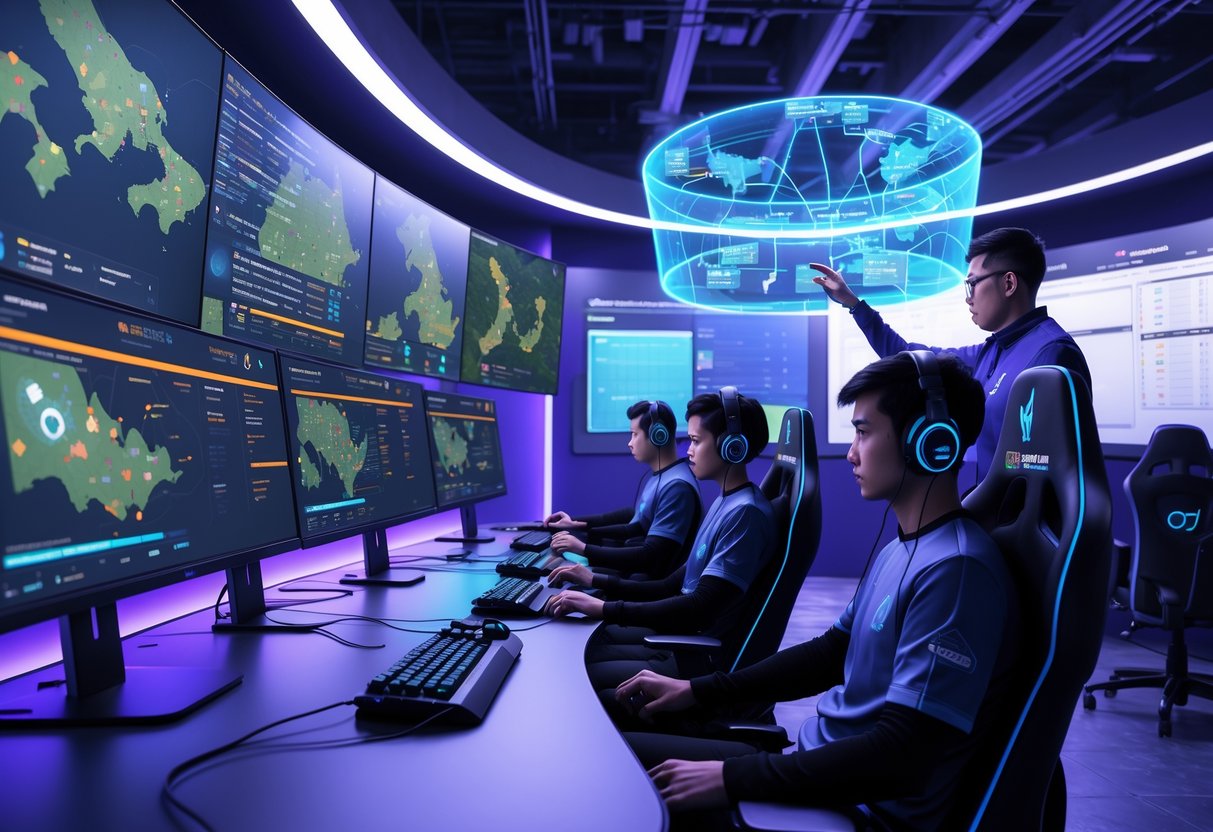
Bootcamps put a heavy spotlight on strategy and game analysis. These skills really separate the pros from the rest. Teams use the time to practice advanced tactics, break down opponents, and get better at making snap decisions.
Practising Advanced Strategies
Teams spend hours every day drilling team comps and coordination. You can’t pick up these strats in casual games.
Pro squads repeat the same scenario over and over—sometimes 20-30 times in a row. For example, they might run late-game rotations in League or retake strats in CS.
That repetition builds muscle memory. When the stakes are high, you want your moves to be automatic.
Coaches pause practice to point out mistakes. Players can jump right back in and try again, no need to wait for another game.
Advanced strategies need everyone on the same page. Bootcamps give teams the uninterrupted time to get there.
Analysing Gameplay and Opponents
Teams use special software to pick apart match footage during bootcamps. Analysts dig into upcoming opponents and build detailed reports.
Teams spend hours a day studying enemy patterns. They figure out what strats opponents love, where they slip up, and how they react under pressure.
Analysis sessions usually cover:
- Enemy team’s go-to strategies
- Player habits
- Draft and ban tendencies
- Late-game choices
- How teams handle pressure
Coaches and analysts team up to craft counter-strats. They prep backup plans for whatever might come up.
Heads up: A lot of amateur teams skip this step. Pro bootcamps spend 2-3 hours a day just on opponent research.
Adaptive In-Game Decision Making
Bootcamps teach players to adjust on the fly when their first plan flops. That flexibility can make or break a tournament run.
Teams practice switching strats mid-game. Maybe they start aggressive but have to pivot to a late-game setup.
Coaches throw curveballs during scrims. Players learn to talk through problems and make group calls fast.
Decision-making drills include:
- Quick strat swaps in practice
- Communication under fake pressure
- Reviewing bad decisions together
- Scenario training for common situations
The constant repetition means players face tough choices every day. That builds the confidence they need to handle real tournament chaos.
Individual Skill Enhancement
Bootcamps push each player to reach their peak performance with personalized training and expert guidance. The intense environment lets esports athletes target weaknesses while building mental toughness.
Personal Mechanics and Reaction Training
During bootcamp, players often see huge improvements in their mechanics. Reaction time training sits at the heart of most individual development programs.
Most bootcamps bring in specialized software to track reaction speeds. Players run through the same scenarios over and over, building muscle memory for those clutch moments.
Aim training takes up hours each day, especially in shooter games. Players grind through precision drills and tracking exercises. It’s not unusual to see a 15-20% jump in accuracy within a few weeks.
Movement mechanics matter for every game. MOBA players grind last-hitting and positioning. Fighting game players repeat combos until they barely have to think about it.
A lot of places use eye-tracking tech now. Coaches watch where players look during tense moments. They use this info to help players make faster decisions.
Tailored Coaching and Feedback
Professional coaching really changes the game for individual development. Every esports athlete gets personalized attention focused on their needs.
Video review sessions happen daily with experienced coaches. We break down gameplay footage, frame by frame, so players see exactly what went wrong and how to improve.
Most coaches have pro experience themselves. They get the mental pressure of competition. Their feedback covers technical skills and psychological prep.
One-on-one coaching sessions usually last a couple of hours each day. Players drill weaknesses flagged by gameplay analysis. Immediate feedback speeds up learning like nothing else.
Performance tracking systems follow progress closely. Coaches tweak training programs based on real data, so players don’t get stuck or pick up bad habits.
Mental Focus and Stress Management
Mental conditioning really separates the good from the great when pressure hits. Bootcamps dedicate real time to psychological training.
Meditation and mindfulness sessions help players keep calm during stressful moments. Many bootcamps bring in sports psychologists who teach breathing techniques for tense matches.
Coaches run stress simulation drills to mimic tournament pressure. They throw distractions at players so they can build mental resilience for the real thing.
Sleep optimization matters a lot. Bootcamps enforce strict sleep schedules because poor sleep will wreck reaction times and decisions.
Concentration training uses focused exercises to stretch attention spans. Players practice staying sharp for entire matches, which helps avoid those late-game slip-ups.
Performance anxiety workshops tackle common fears and doubts. Players learn how to turn nerves into positive energy instead of letting it drag them down.
Physical Fitness and Conditioning in Bootcamps
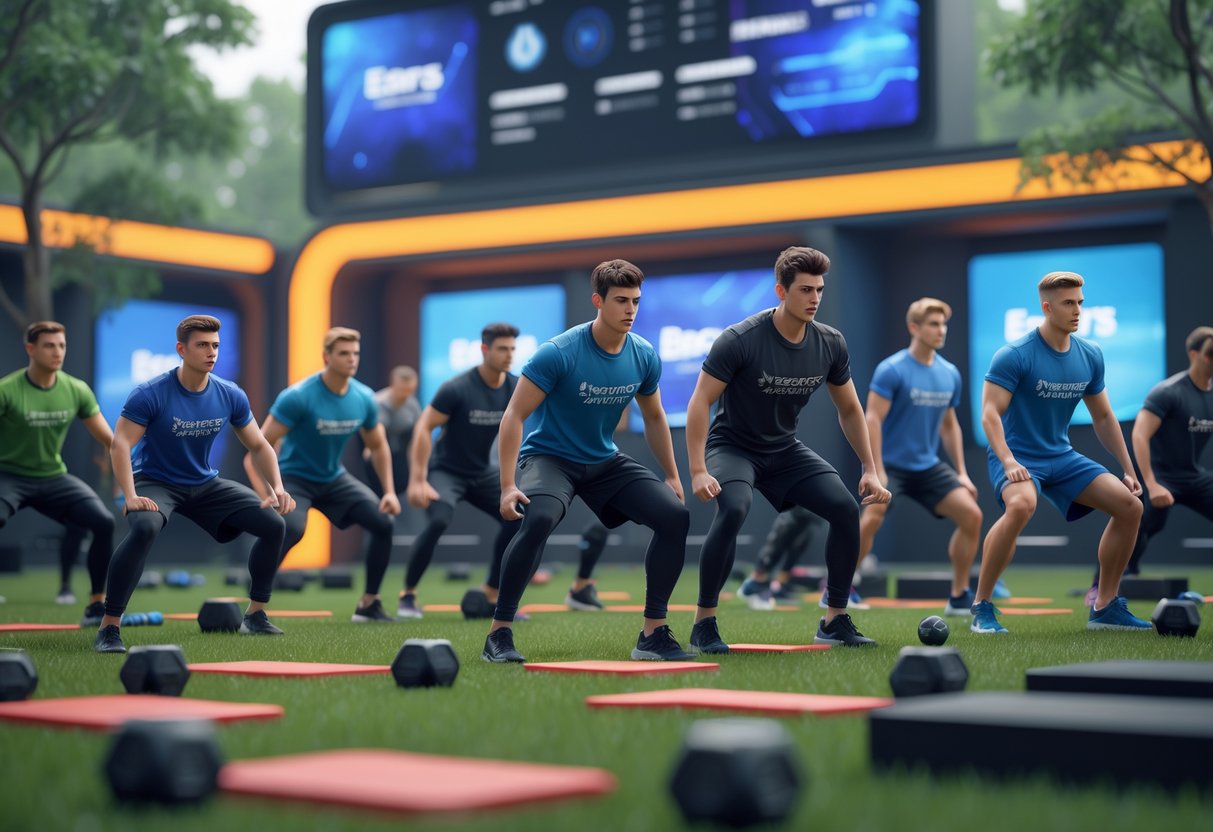
Professional bootcamps now blend structured physical training with gaming practice. The idea is to combine targeted workouts, mental health support, and recovery routines to boost player performance.
Physical Training for Esports Players
We’ve watched bootcamps change their approach to physical conditioning. Top-tier facilities now have dedicated fitness areas built for esports athletes.
They focus on three main things. Reaction time drills for hand-eye coordination. Posture correction to fight off all those hours sitting. Endurance training to help players stay focused during long gaming sessions.
Typical training might look like:
- Wrist and finger exercises for 15-20 minutes daily
- Core strengthening with planks and stability work
- Cardio like light jogging or cycling
- Vision exercises using eye tracking and focus drills
Most bootcamps schedule these physical sessions between gaming blocks. It keeps players from burning out and keeps them moving.
Teams that prioritize fitness tend to perform better in finals. Players can focus longer when it really counts.
Incorporating Mental and Physical Health
Bootcamps now treat mental conditioning just as seriously as mechanical skill. We know esports athletes face unique psychological stress during competition.
Physical activity makes a real difference in mental performance. Exercise releases endorphins, lowers stress, and lifts mood—especially important during tough bootcamp stretches.
Stress management techniques are now a staple:
| Activity | Duration | Benefit |
|---|---|---|
| Meditation | 10-15 minutes | Focus improvement |
| Light stretching | 20 minutes | Tension relief |
| Team walks | 30 minutes | Communication building |
| Breathing exercises | 5 minutes | Pre-match calming |
Nutrition education is part of the package. Players learn what to eat and drink to keep energy up and avoid crashes.
A lot of facilities have sports psychologists working with trainers. This way, players get support for both body and mind.
Optimising Recovery and Rest
Recovery protocols are now just as detailed as practice schedules. We’ve found that good rest directly sharpens reaction time and decision-making.
Sleep is the big one. Most bootcamps enforce strict sleep schedules with at least 7-8 hours. Players use blackout curtains and cut screen time before bed.
Active recovery methods include:
- Foam rolling
- Gentle yoga or stretching
- Massage therapy
- Hot and cold therapy
Rest breaks between practice blocks help prevent burnout. Teams usually take 15-minute breaks every couple of hours.
Wearable tech tracks recovery. Players monitor heart rate and sleep quality, and coaches adjust training based on that data.
Hydration is a must, especially during recovery. Bootcamps provide electrolyte drinks and keep an eye on fluid intake all day.
The best programs balance hard practice with real recovery. Players simply perform better when their bodies get the chance to recharge.
Key Facilities and Equipment Provided
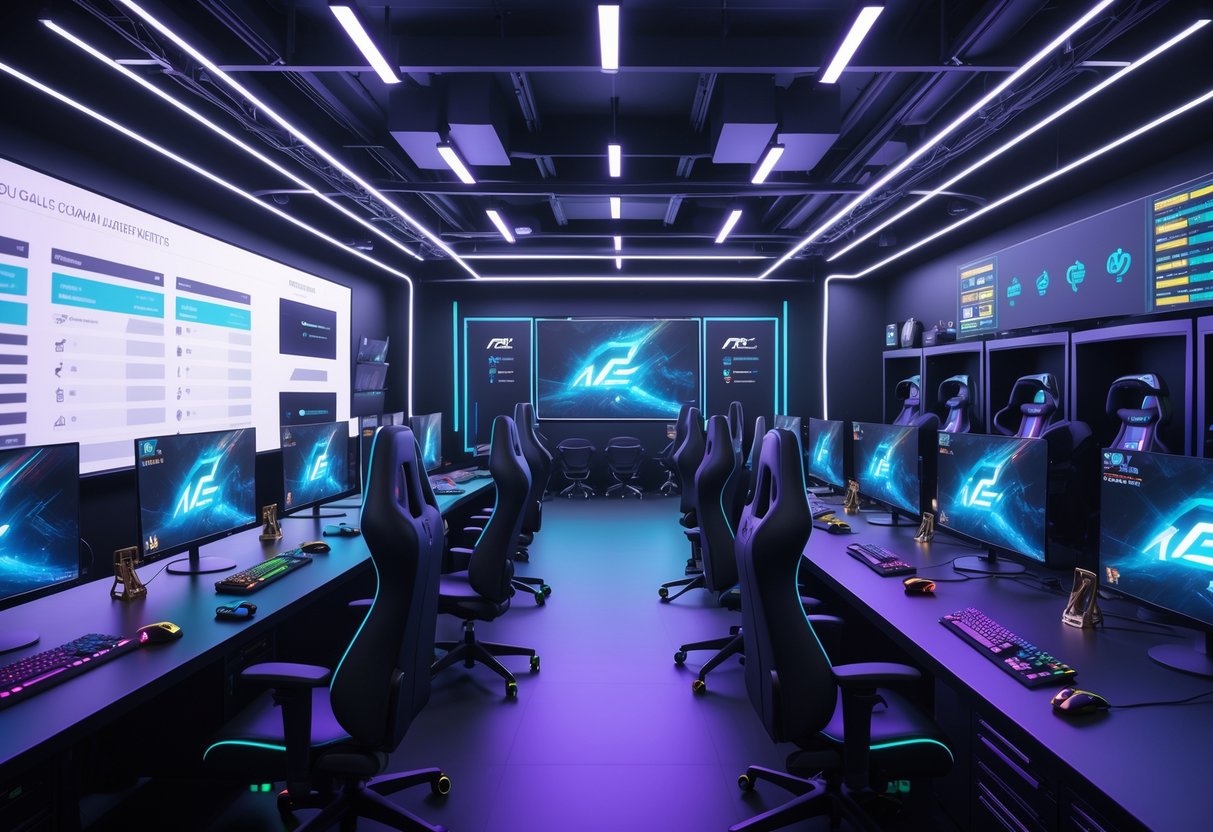
Top esports bootcamps pour resources into high-end gaming hardware and comfy living spaces. The best places mix pro-grade gear with recovery amenities to keep players at their best.
High-End Gaming Setups
Professional bootcamps set up gaming stations that match tournament specs. Each one has high-refresh monitors (240Hz or better), mechanical keyboards with custom switches, and precision mice.
Core Hardware Specs:
- Gaming PCs with RTX 4080+ graphics cards
- 32GB+ RAM for smooth play
- SSD storage for fast loads
- Dual monitors for practice and analysis
Chairs matter more than you’d think. Ergonomic gaming chairs support marathon sessions without killing your back.
Noise-cancelling headsets keep team comms clear during scrims. Bootcamps usually have several headset brands so players can pick what feels right.
Internet runs on dedicated fiber lines with sub-5ms ping. Backup connections mean practice won’t get interrupted.
Choosing the Right Bootcamp Facility
Location really affects cost and quality. Bootcamps near esports hubs offer better networking but usually charge more.
Pick a bootcamp that specializes in your game. A CS facility might not have what a League of Legends team needs.
Key Questions:
- What’s the player-to-coach ratio?
- Are practice schedules flexible?
- Do they offer match analysis tools?
- What’s included in the daily rate?
Some bootcamps bundle accommodation and meals. Others bill for each service.
Ask how often they refresh their equipment. The best facilities upgrade hardware every year or so to stay current.
Supportive Living and Recovery Amenities
Quality bootcamps realize rest matters as much as practice. Private bedrooms with blackout curtains help players stick to sleep routines.
Common areas have kitchens with healthy snacks and meal prep setups. Nutrition can be a struggle during intense training.
Recovery facilities usually include:
- Massage therapy rooms
- Fitness gear for conditioning
- Quiet zones for downtime
- Streaming setups for content creation
Some top bootcamps offer sports psychology sessions and stress workshops. These extras help players handle tournament nerves.
Gaming expert James Connolly says the best bootcamps “treat players like athletes, not just gamers—proper rest and recovery are essential for maintaining focus during 10+ hour practice days.”
Laundry and housekeeping take daily chores off players’ plates, so they can focus fully on improving rather than dealing with distractions.
Bootcamps Across Top Esports Titles
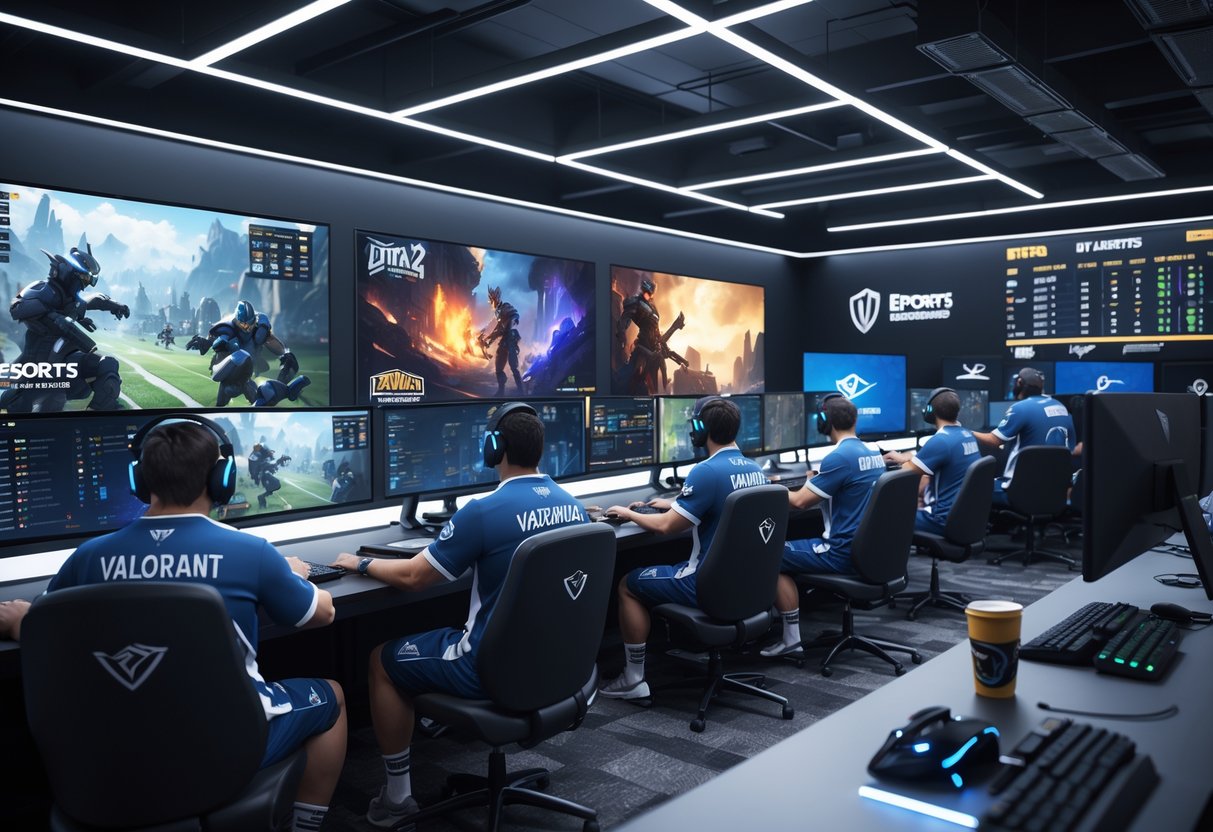
Different games need different training approaches. Tactical shooters focus on aim and team coordination, while MOBAs lean into complex macro play. Each big esports title has its own bootcamp style with unique methods.
Valorant Training Camps
Valorant bootcamps drill tactical coordination and aim. Teams often grind 8-10 hours daily, sharpening crosshair placement and agent skills.
Most camps use aim trainers like Kovaak’s plus in-game drills. Players practice specific map scenarios, learning smoke lineups and flash timings.
Key Training Elements:
- Headshot-only deathmatch
- 5v5 scrims against other teams
- Agent role specialization
- Anti-stratting opponent teams
Camps usually last 2-4 weeks before big tournaments. Teams like Fnatic and Team Liquid often use European facilities with top-tier monitors and fiber internet.
A typical day might start with aim warm-ups at 9am, tactical reviews, and evening scrims. Players often see a 20-30% boost in headshot rates after these camps.
League of Legends Team Bootcamps
League bootcamps are some of the most established. Teams move to regions with tougher competition, especially South Korea and China.
Korean bootcamps give access to the world’s best solo queue players. Western teams like G2 Esports often spend months in Seoul before Worlds.
Usual Schedule:
- Solo queue (4-6 hours)
- Team scrims (4-5 hours)
- VOD review (2-3 hours)
- Champion mastery drills
Chinese bootcamps offer scrim partners who try wild strategies. The high-pressure setting pushes teams past their limits.
Gaming houses bring in dedicated analysts and coaches. Players follow strict routines with set meals and rest breaks to avoid burnout during those 12-hour days.
Overwatch Preparation Sessions
Overwatch bootcamps drill team coordination and hero swaps. The game’s fast pace demands split-second communication between all six players.
Teams practice compositions like dive or bunker. Each session includes drills where players call out enemy spots and ultimates.
Core Components:
- Role-specific mechanics
- Team fight simulations
- Ultimate economy drills
- Map control exercises
Pro teams usually bootcamp 3-6 weeks before big events. Facilities offer custom game modes for practicing tough situations like overtime pushes.
Communication workshops help teams nail down callouts. Many camps bring in sports psychologists to help players handle the pressure—one mistake in a team fight can cost a whole round.
Community and Networking Opportunities
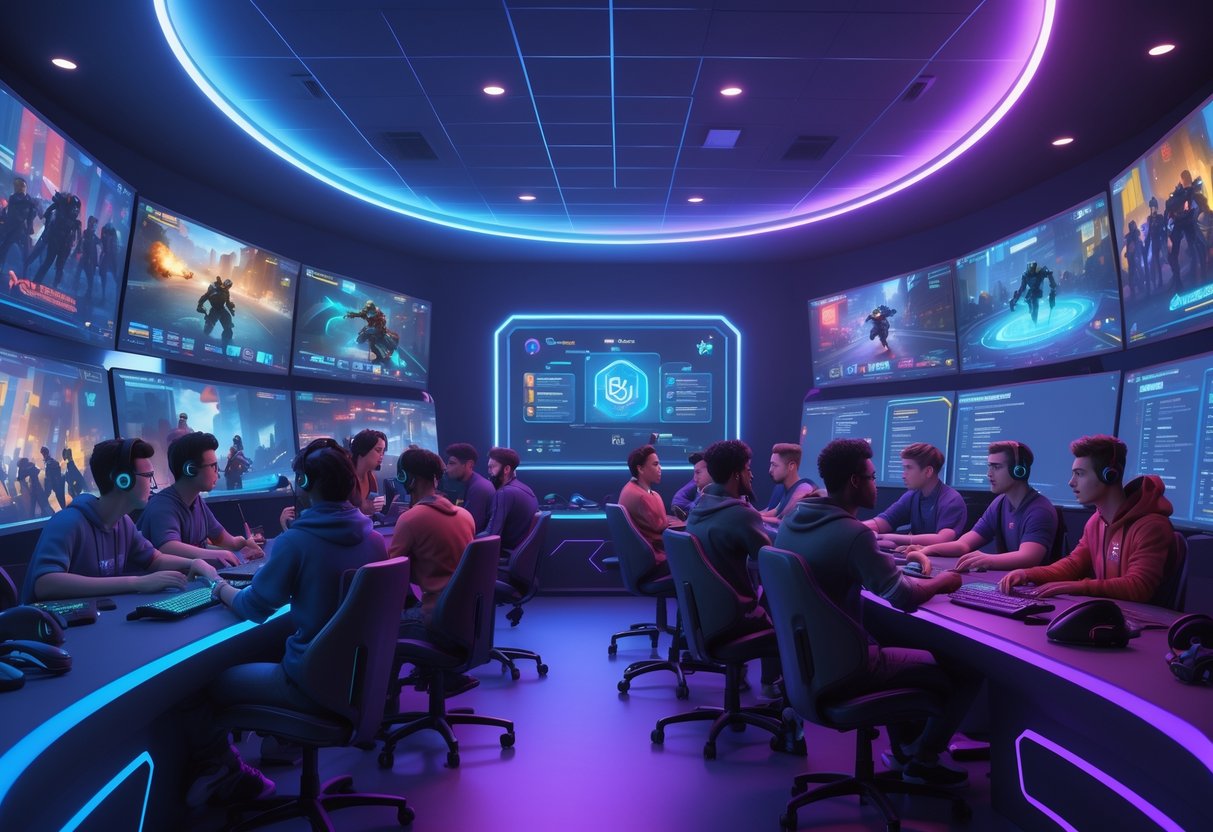
Bootcamps create spaces where lasting connections can form across the esports world. These intense environments bring players, coaches, and industry folks together, sparking opportunities that go way beyond the camp itself.
Connections Within the Esports Community
Bootcamps naturally mix passionate gamers from all sorts of backgrounds and skill levels. That kind of environment leads to real friendships that often last for years.
Players meet teammates for future projects. Many top esports teams first came together during bootcamps. These bonds form when players spot each other’s strengths and share that drive to win.
We’ve seen plenty of players who met at a camp later build championship squads. The grind and shared experience create trust that pays off in matches.
Coaches and support staff build their networks too. Bootcamps attract experienced coaches, analysts, and mental health pros. These connections help build the support system behind every pro athlete.
Local bootcamps especially strengthen regional scenes. Players who train together often keep meeting up for local tournaments and events.
Professional Networking for Players
Relationships and reputation drive the esports industry. Bootcamps set up structured spaces where aspiring pros can show off their work ethic and skills right in front of industry insiders.
Coaches scout talent during bootcamps. You’ll spot professional coaches at these events, actively looking for promising players. If you perform well during bootcamp training, you might land a team tryout or even catch a sponsor’s eye.
Industry professionals share career insights. Many bootcamps invite guest speakers from big esports orgs, streaming platforms, and tournament organizers. These sessions put you face-to-face with hiring managers and decision-makers.
Honestly, it’s smart to treat every bootcamp interaction as a possible career move. The esports world is still pretty tight-knit, and word about your reputation travels fast through these networks.
Content creators find collaboration partners. Streamers and YouTubers often join bootcamps to level up their gameplay and meet other creators. These connections usually spark collaborations and help everyone grow their audiences.
Legacy and Knowledge Sharing
Experienced players use bootcamps to pass knowledge down to the next wave of esports athletes. Mentorship like this keeps the cycle of improvement going throughout the community.
Veteran players share strategic insights. Pros nearing retirement often show up as coaches or advisors. Their tournament stories and experience give younger players context they just can’t get from practice alone.
Regional playing styles mix and evolve. International bootcamps bring together different strategies and approaches. Maybe European tactics blend with Asian mechanical skills, and suddenly, you’ve got a fresh meta on your hands.
Technical knowledge spreads efficiently. Players pick up advanced techniques, new setups, and smarter training routines. They carry these lessons back to their home scenes, raising the skill bar for everyone.
Bootcamp alumni often step up as community leaders. They organize local tournaments or run training sessions, helping the next group of pros get started.
Pros and Cons of Esports Bootcamps
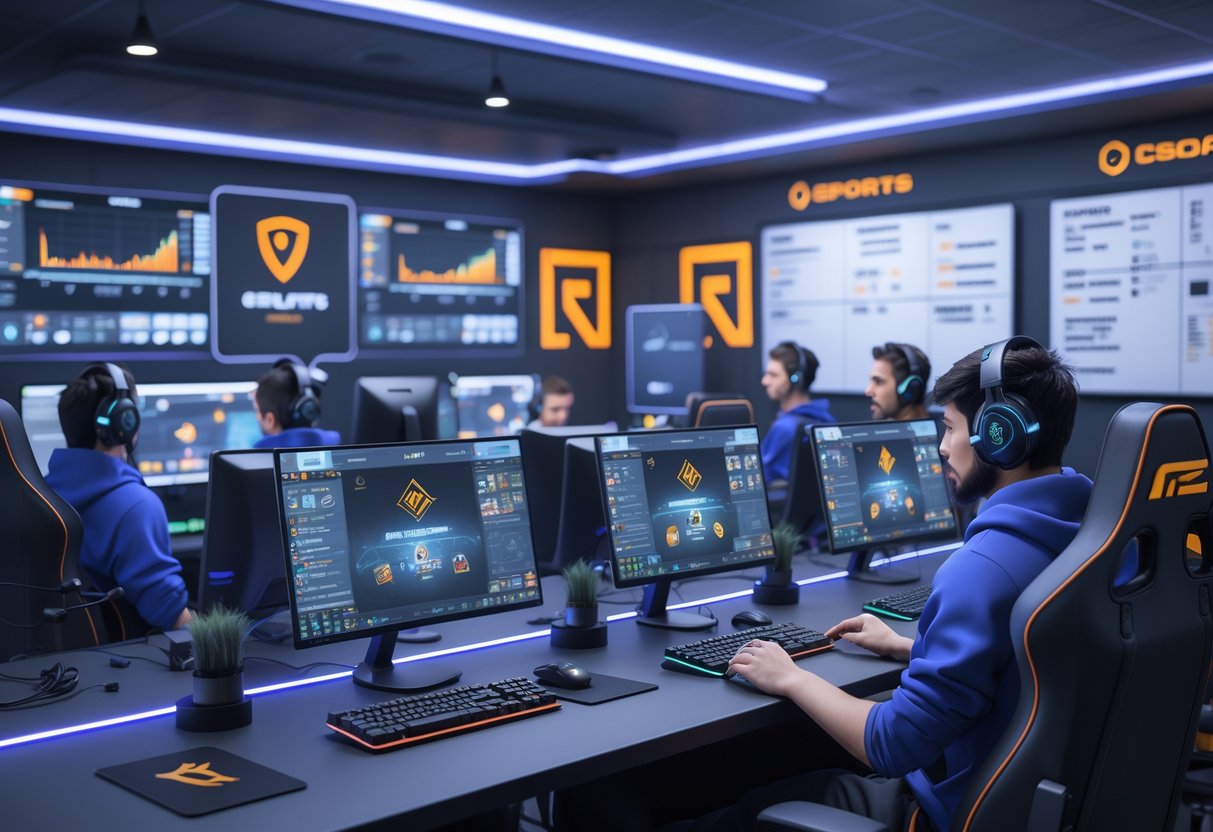
Bootcamp training means focused practice time and top-notch coaching, but it comes with a big price tag and a heavy time commitment. Players have to weigh the skill gains against burnout risks and high costs.
Major Benefits for Players and Teams
Accelerated Skill Development happens when players put in 8-12 hour days in a structured environment. Coaches break down gameplay footage and give instant feedback on things like positioning, timing, and decisions.
Teams usually notice better communication within a week. Players build up shared callouts and a strategic understanding that would take months to develop online.
Access to Premium Facilities gives teams gaming gear they couldn’t buy on their own. Most bootcamps offer 240Hz monitors, mechanical keyboards, and rock-solid internet with super low ping.
The controlled setting wipes out distractions like family interruptions or spotty Wi-Fi. Teams can zero in on practice without outside stress messing with their performance.
Mental Conditioning programs teach players how to handle tournament nerves. Sports psychologists run breathing exercises, visualization drills, and stress management lessons borrowed from traditional sports.
Physical fitness routines show up in many bootcamps, too. Regular exercise sharpens reaction times and helps prevent repetitive strain injuries—always a concern in esports.
Strategic Analysis sessions focus on reviewing opponent footage and building counter-strategies. Coaches break down enemy team habits and craft game plans for upcoming matches.
Potential Drawbacks and Challenges
High Financial Costs hit team budgets hard. Premium bootcamps might charge £2,000-5,000 per player for two weeks, and that doesn’t even cover travel or hotels.
Semi-pro teams often can’t justify spending that much without a guaranteed payday. Sometimes, the investment is bigger than the prize pool for lower-tier tournaments.
Burnout Risks go up when players grind for 12 hours a day. You might run into mental fatigue, lose motivation, or see your performance drop if you push too far.
Some players find the isolation tough. Being away from family and friends can lead to homesickness, which drags down morale and personal wellbeing.
Limited Flexibility forces teams to stick to set schedules and training styles. Players can’t easily tweak practice times for personal stuff or their favorite learning methods.
No Guaranteed Results even after all that effort and cash. Sometimes, teams barely improve or just can’t turn bootcamp lessons into tournament wins.
Pressure can make team dynamics worse. Personality clashes tend to pop up when everyone’s stuck together for days under stress.
Balancing Investment and Outcomes
ROI Calculations matter—a lot. Compare bootcamp expenses to what you might actually win at tournaments. Regional league teams might struggle to justify £20,000+ for training.
You might want to try alternative training methods like online coaching or local practice spaces. Lots of pro coaches offer remote sessions for way less than a full bootcamp.
Timing Matters for bootcamp success. Scheduling intense training 2-3 weeks before big tournaments usually works better than doing it in the off-season.
Start with shorter programmes to see if the bootcamp style fits your team. One-week bootcamps cost less and let you test the waters before diving in.
Budget-Friendly Options include sharing a facility with another team or picking a bootcamp in a cheaper location. Some orgs even offer subsidized training to promising amateurs.
Keep an eye on performance metrics throughout. Track things like reaction times, accuracy, and team coordination to see if you’re actually improving.
Heads up: Steer clear of bootcamps that promise miracles or charge a fortune without legit coaching credentials.
Integrating Bootcamps Into Long-Term Success
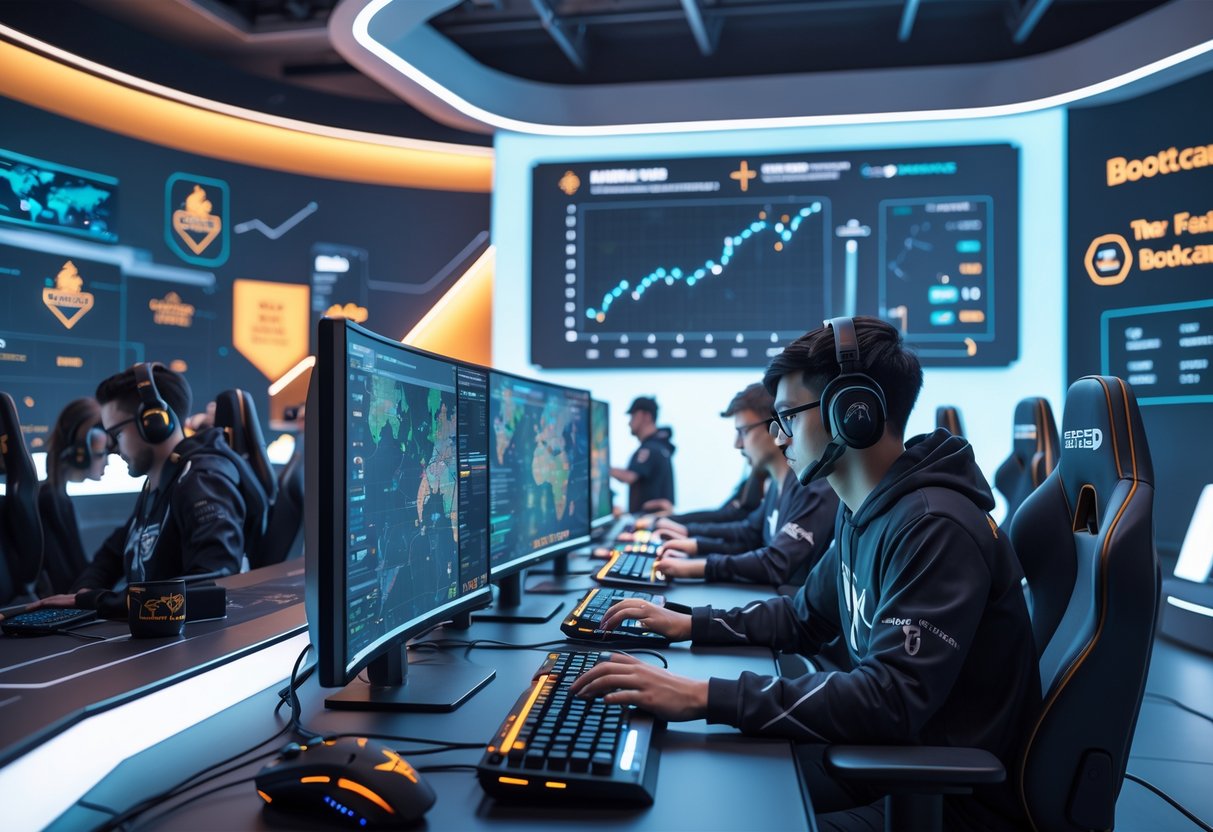
Top esports athletes treat bootcamps as steps on the ladder, not just one-off events. The real test comes after the bootcamp, when you have to keep up the momentum and build sustainable career growth over the long haul.
Sustaining Growth Beyond Bootcamp
The weeks right after a bootcamp often decide if the investment actually pays off. A lot of players struggle to stick with the discipline and structure they had during those intensive days.
Creating home training schedules becomes essential once bootcamp ends. Top performers set up daily practice blocks, keep team chats going, and continue reviewing strategy. This routine helps prevent skills from slipping.
The most successful players set up accountability systems with their teammates. Weekly meetings, shared practice logs, and regular scrims help everyone keep up the bootcamp spirit.
Performance tracking is still key for long-term growth. Players who watch their stats, review their own footage, and set monthly goals tend to keep improving, while others fall back into old habits.
Adapting Training Methods
Bootcamp techniques need to change as players move through their careers. What works for rookies doesn’t always fit the needs of seasoned pros.
Personalized skill development matters more as you get better. Advanced players focus on specific weaknesses they spotted during bootcamp, not just general improvement. This targeted approach speeds up growth in competitive scenes.
You have to adjust training intensity, too. Players learn to mix high-intensity stretches that feel like bootcamp with rest periods that keep burnout at bay but still maintain their edge.
Technology integration modernizes training. Teams use performance analysis software, communication tools, and streaming platforms to bring bootcamp methods into their daily grind.
Bootcamps as Part of Career Progression
Pro esports careers involve several bootcamp experiences at different stages. Each one serves a unique purpose in building a long-term career.
Early-career bootcamps focus on basics and team chemistry. Mid-career sessions shift to strategic refinement and leadership. Veteran players go to bootcamps to adapt to new patches or gear up for major tournaments.
| Career Stage | Bootcamp Focus | Duration | Frequency |
|---|---|---|---|
| Beginner | Basic mechanics, teamwork | 2-4 weeks | 1-2 per year |
| Semi-professional | Strategy, communication | 3-6 weeks | 2-3 per year |
| Professional | Tournament prep, meta adaptation | 4-8 weeks | 3-4 per year |
Industry networking at bootcamps builds lasting connections. Coaches, analysts, and players you meet during training often come back around with new opportunities, recommendations, or advice.
Timing your investment really matters. Players who attend bootcamps right before big tournaments, during off-seasons, or when switching teams usually see better results than those who go at random.
Future of Esports Bootcamps
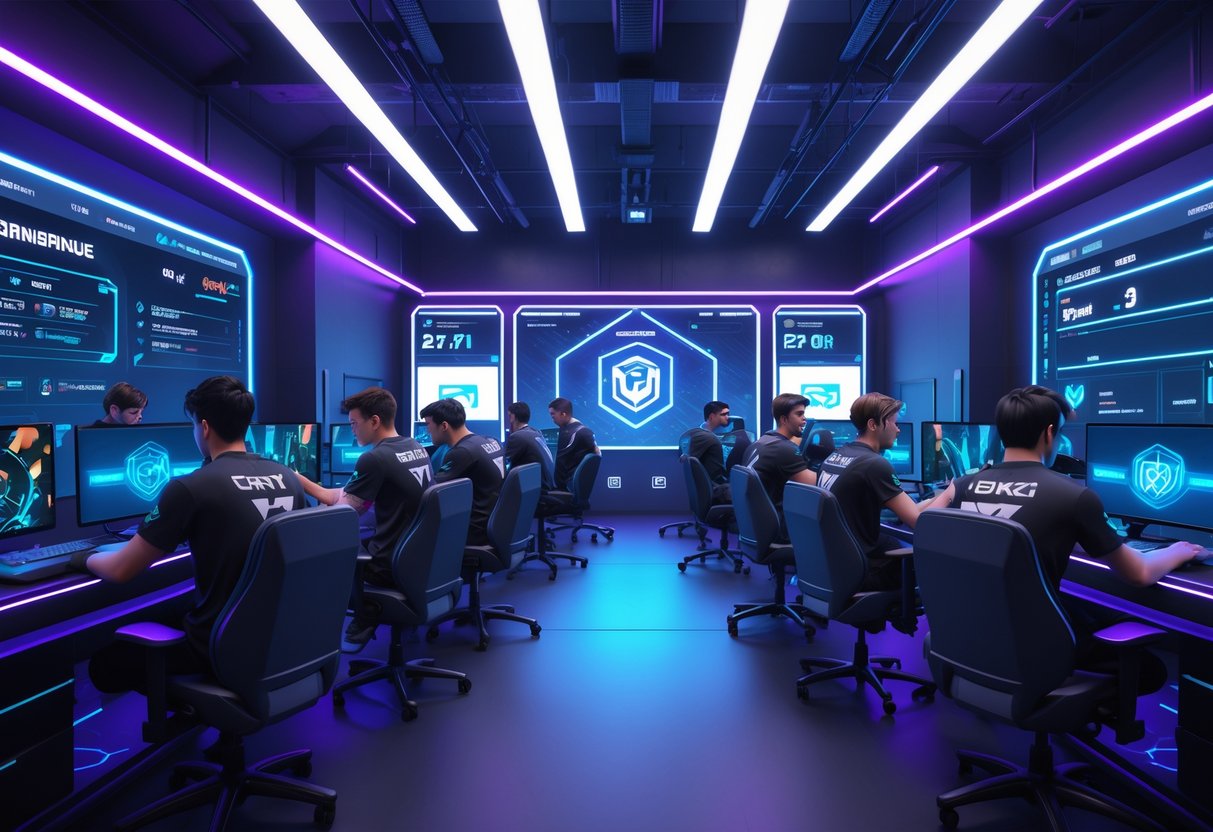
Esports bootcamps are changing fast. New tech and training methods are transforming how pros prep, and the industry keeps growing—playing a bigger part in shaping tomorrow’s top gamers.
Emerging Trends in Esports Training
Modern bootcamps are rolling out AI-driven coaching systems that analyze player performance on the fly. These tools track reaction times, decision-making, and strategies to give personalized feedback.
Virtual reality training is popping up in top-tier facilities. Players can now practice scenarios you just couldn’t recreate with traditional setups.
Mental health support is finally getting the attention it deserves. Most pro bootcamps now include:
- Sports psychologists
- Stress management workshops
- Burnout prevention programs
- Sleep optimization training
Biometric monitoring is on the rise, too. Coaches look at heart rate variability, eye tracking, and even brain activity to understand player stress during tough moments.
Data analytics platforms are replacing basic gameplay reviews. Coaches can sift through thousands of hours of footage to spot exactly where a player shines or struggles.
Global Expansion and Innovation
Esports bootcamps are spreading beyond the usual hotspots like South Korea and Europe. New training centers are popping up across Southeast Asia, the Middle East, and Latin America.
Remote bootcamp models have taken off since 2020. Teams can now tap into pro coaching and structured training without moving across the globe. This makes high-level training possible for players in smaller markets.
Cross-cultural bootcamps are getting more popular. Players from different countries train together, swap strategies, and build international networks that can boost their careers.
Investment in bootcamp infrastructure is ramping up. New facilities now feature:
| Feature | Traditional Setup | Modern Bootcamp |
|---|---|---|
| Gaming PCs | Standard specs | Custom builds with 240Hz+ monitors |
| Internet | Home broadband | Dedicated fibre with <1ms ping |
| Coaching | Part-time help | Full-time professional staff |
| Analytics | Basic stats | Advanced performance tracking |
Mobile esports bootcamps are starting to serve the booming smartphone gaming scene, especially in places where mobile dominates.
Role in Shaping Professional Esports
Pro organizations now see bootcamps as a must-have, not a nice-to-have. Most top teams run permanent training facilities year-round.
Bootcamps have turned into talent discovery centers. Semi-pros can join intensive programs and show off their skills to scouts and managers.
The path from amateur to pro is running right through these bootcamp systems. Young players learn discipline and the skills needed for high-level competition in a structured setting.
Partnership programs between bootcamps and schools are opening up real career paths. Students can now include esports training in their official qualifications.
Bootcamps are setting the standard for pro training across the board. This helps level up skill consistency and makes esports look more and more like a legit sport.
Bootcamps are even shaping broader gaming culture. Training methods built for pros are trickling down to casual gamers who want to up their game in a more systematic way.
Certification for bootcamp programs is starting to roll out. Accredited centers can now offer recognized qualifications, which help players show sponsors and teams that they’re serious.
Frequently Asked Questions
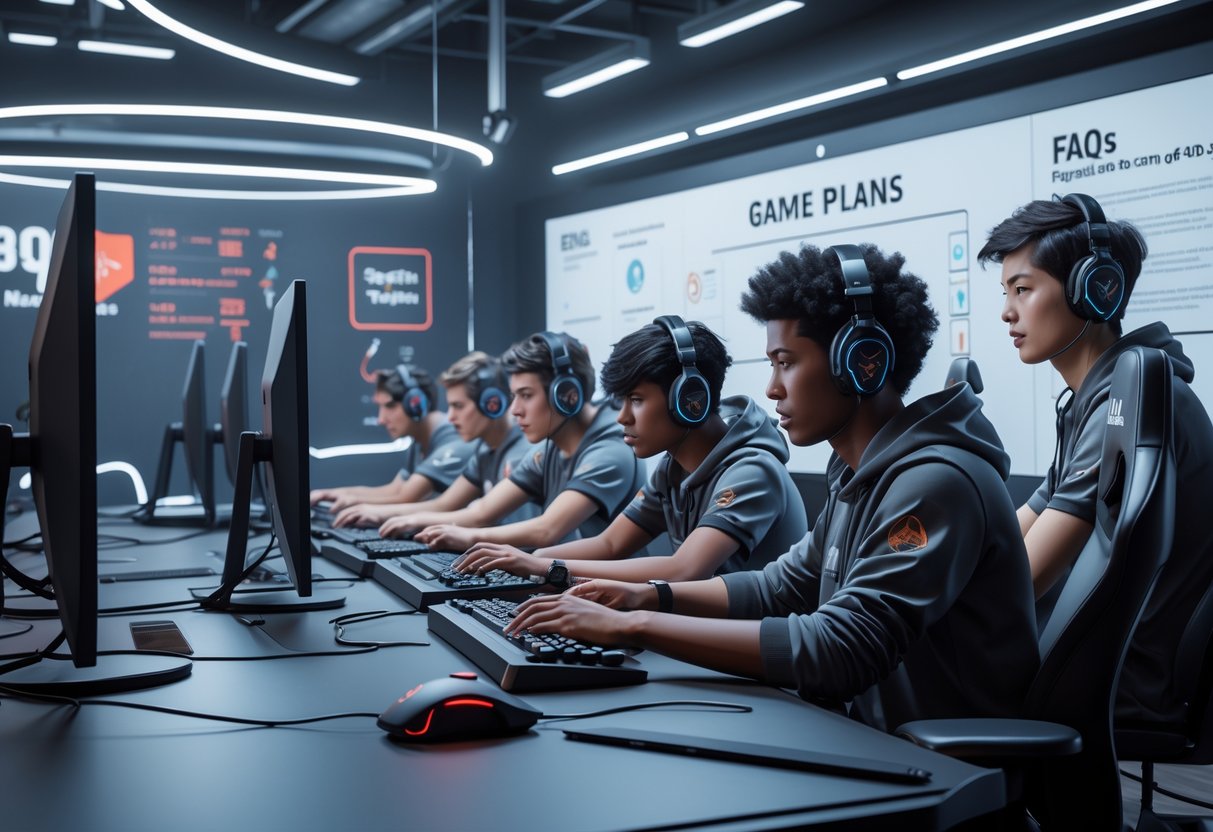
Bootcamp participants usually want to know about skill improvement, career paths, and daily training routines. They also ask about teamwork and how bootcamp training really stacks up against regular gaming.
How can participating in an esports bootcamp enhance my gaming skills?
Esports bootcamps boost your skills fast with intense, structured practice. You’ll train on pro-level equipment and get feedback from coaches who spot things you might never notice on your own.
The focused environment helps you work on improvement without the usual distractions. Most bootcamps include video analysis of your matches, so you can catch mistakes you’d probably overlook at home.
You’ll also get to play against tougher opponents more often. That kind of challenge pushes your abilities much faster than casual gaming sessions ever could.
What kind of career opportunities open up after attending an esports bootcamp?
Bootcamps can really open doors if you want to join a professional gaming team. Scouts and team managers often stop by these places, hoping to spot the next big talent for their rosters.
You might find opportunities outside of just playing, too. Coaching or analysis roles sometimes pop up for people who stand out.
Some folks end up as content creators or streamers. They use their new skills to draw in bigger audiences and build a real following.
Networking turns out to be a huge perk as well. You’ll meet other players, coaches, and industry folks who could offer collaborations or even jobs down the line.
What are the key benefits of enrolling in an esports training programme?
Training programmes give you structured learning, which is pretty tough to get on your own. Instead of just hoping random practice works, you’ll follow methods that actually help you improve.
Professional coaches break down strategies and game mechanics in ways that make sense. You’ll start making better decisions during matches because you actually understand what’s happening.
The environment pushes you to build discipline and good practice habits. Learning how to train the right way really matters if you want to keep getting better.
Could you explain the role of teamwork and communication skills development in esports bootcamps?
Bootcamps put a big focus on team coordination. You’ll practice communication drills and join team sessions to get those callouts right and build trust with your teammates.
A lot of programmes add team-building activities that aren’t just about gaming. These help everyone figure out different personalities and how to actually talk to each other.
You’ll also get to work on handling conflicts and keeping the team’s mood up during rough patches. Honestly, those skills are a must when you’re under pressure at tournaments.
What should I expect from a typical day at an esports bootcamp?
Most days kick off with a couple hours of individual practice. That might mean working on mechanics, aim, or champion-specific stuff, depending on your game.
After that, you’ll jump into team practice. Sometimes you’ll scrim against other bootcamp teams or outsiders, and coaches will go over your gameplay to point out what you can do better.
You can expect to fit in some physical exercise and mental wellness activities, too. A lot of bootcamps get that your health really affects how well you play and how long you last in tournaments.
How does an esports bootcamp differ from traditional gaming practice?
Bootcamps give you access to professional coaching, which you just don’t get at home. Coaches spot issues in your gameplay that you’d probably miss if you were practicing alone.
The competitive environment really pushes you. You’re always up against skilled opponents, not just random players you find online.
Bootcamps also help you build professional habits—stuff like sticking to a good sleep schedule, eating right, and keeping up with exercise. Most people never even think about those things during regular gaming practice.


